- Home
- Kahlil Gibran
The Broken Wings Page 6
The Broken Wings Read online
Page 6
She shook her head and gazed at something invisible on the ceiling of the temple; a sorrowful smile appeared on her lips; then she said, "No, no my beloved. Heaven placed in my hand a cup, full of vinegar and gall; I forced myself to drink it in order to know the full bitterness at the bottom until nothing was left save a few drops, which I shall drink patiently. I am not worthy of a new life of love and peace; I am not strong enough for life's pleasure and sweetness, because a bird with broken wings cannot fly in the spacious sky. The eyes that are accustomed to the dim light of a candle are not strong enough to stare at the sun. Do not talk to me of happiness; its memory makes me suffer. Mention not peace to me; its shadow frightens me; but look at me and I will show you the holy torch which Heaven has lighted in the ashes of my heart, you know that I love you as a mother loves her only child, and Love only taught me to protect you even from myself. It is Love, purified with fire, that stops me from following you to the farthest land. Love kills my desires so that you may live freely and virtuously. Limited love asks for possession of the beloved, but the unlimited asks only for itself. Love that comes between the naiveté and awakening of youth satisfies itself with possessing, and grows with embraces. But Love which is born in the firmament's lap and has descended with the night's secrets is not contended with anything but Eternity and immortality; it does not stand reverently before anything except deity.
When I knew that the Bishop wanted to stop me from leaving his nephew's house and to take my only pleasure away from me, I stood before the window of my room and looked toward the sea, thinking of the vast countries beyond it and the real freedom and personal independence which can be found there. I felt that I was living close to you, surrounded by the shadow of your spirit, submerged in the ocean of your affection. But all these thoughts which illuminate a woman's heart and make her rebel against old customs and live in the shadow of freedom and justice, made me believe that I am weak and that our love is limited and feeble, unable to stand before the sun's face. I cried like a king whose kingdom and treasure have been usurped, but immediately I saw your face through my tears and your eyes gazing at me and I remembered what you said to me once (Come, Selma, come and let us be strong towers before the tempest. Let us stand like brave soldiers before the enemy and face his weapons. If we are killed, we shall die as martyrs; and if we win, we shall live as heroes. Braving obstacles and hardships is nobler than retreat to tranquillity.) These words, my beloved, you uttered when the wings of death were hovering around my father's bed; I remembered them yesterday when the wings of despair were hovering above my head. I strengthened myself and felt, while in the darkness of my prison, some sort of precious freedom easing our difficulties and diminishing our sorrows. I found out that our love was as deep as the ocean and as high as the stars and as spacious as the sky. I came here to see you, and in my weak spirit there is a new strength, and this strength is the ability to sacrifice a great thing in order to obtain a greater one; it is the sacrifice of my happiness so that you may remain virtuous and honourable in the eyes of the people and be far away from their treachery and persecution.
In the past, when I came to this place I felt as if heavy chains were pulling down on me, but today I came here with a new determination that laughs at the shackles and shortens the way. I used to come to this temple like a scared phantom, but today I came like a brave woman who feels the urgency of sacrifice and knows the value of suffering, a woman who likes to protect the one she loves from the ignorant people and from her hungry spirit. I used to sit by you like a trembling shadow, but today I came here to show you my true self before Ishtar and Christ.
I am a tree, grown in the shade, and today I stretched my branches to tremble for a while in the daylight. I came here to tell you good-bye, my beloved, and it is my hope that our farewell will be great and awful like our love. Let our farewell be like fire that bends the gold and makes it more resplendent."
Selma did not allow me to speak or protest, but she looked at me, her eyes glittering, her face retaining its dignity, seeming like an angel worthy of silence and respect. Then she flung herself upon me, something which she had never done before, and put her smooth arms around me and printed a long, deep, fiery kiss on my lips.
As the sun went down, withdrawing its rays from those gardens and orchards, Selma moved to the middle of the temple and gazed along at its walls and corners as if she wanted to pour the light of her eyes on its pictures and symbols. Then she walked forward and reverently knelt before the picture of Christ and kissed His feet, and she whispered, "Oh, Christ, I have chosen Thy Cross and deserted Ishtar's world of pleasure and happiness; I have worn the wreath of thorns and discarded the wreath of laurel and washed myself with blood and tears instead of perfume and scent; I have drunk vinegar and gall from a cup which was meant for wine and nectar; accept me, my Lord, among Thy followers and lead me toward Galilee with those who have chosen Thee, contended with their sufferings and delighted with their sorrows."
When she rose and looked at me and said, "Now I shall return happily to my dark cave, where horrible ghosts reside, Do not sympathize with me, my beloved, and do not feel sorry for me, because the soul that sees the shadow of God once will never be frightened, thereafter, of the ghosts of devils. And the eye that looks on heaven once will not be closed by the pains of the world."
Uttering these words, Selma left the place of worship; and I remained there lost in a deep sea of thoughts, absorbed in the world of revelation where God sits on the throne and the angels write down the acts of human beings, and the souls recite the tragedy of life, and the brides of Heaven sing the hymns of love, sorrow and immortality.
Night had already come when I awakened from my swoon and found myself bewildered in the midst of the gardens, repeating the echo of every word uttered by Selma and remembering her silence, ,her actions, her movements, her expression and the touch of her hands, until I realized the meaning of farewell and the pain of lonesomeness. I was depressed and heart-broken. It was my first discovery of the fact that men, even if they are born free, will remain slaves of strict laws enacted by their forefathers; and that the firmament, which we imagine as unchanging, is the yielding of today to the will of tomorrow and submission of yesterday to the will of today -- Many a time, since the night, I have thought of the spiritual law which made Selma prefer death to life, and many a time I have made a comparison between nobility of sacrifice and happiness of rebellion to find out which one is nobler and more beautiful; but until now I have distilled only one truth out of the whole matter, and this truth is sincerity, which makes all our deeds beautiful and honourable. And this sincerity was in Selma Karamy.
THE RESCUER
Five years of Selma's marriage passed without bringing children to strengthen the ties of spiritual relation between her and her husband and bind their repugnant souls together.
A barren woman is looked upon with disdain everywhere because of most men's desire to perpetuate themselves through posterity.
The substantial man considers his childless wife as an enemy; he detests her and deserts her and wishes her death. Mansour Bey Galib was that kind of man; materially, he was like earth, and hard like steel and greedy like a grave. His desire of having a child to carry on his name and reputation made him hate Selma in spite of her beauty and sweetness.
A tree grown in a cave does not bear fruit; and Selma, who lived in the shade of life, did not bear children.....
The nightingale does not make his nest in a cage lest slavery be the lot of its chicks.... Selma was a prisoner of misery and it was Heaven's will that she would not have another prisoner to share her life. The flowers of the field are the children of sun's affection and nature's love; and the children of men are the flowers of love and compassion.....
The spirit of love and compassion never dominated Selma's beautiful home at Ras Beyrouth; nevertheless, she knelt down on her knees every night before Heaven and asked God for a child in whom she would find comfort and consolation... She praye
d successively until Heaven answered her prayers....
The tree of the cave blossomed to bear fruit at last. The nightingale in the cage commenced making its nest with the feathers of its wings.
Selma stretched her chained arms toward Heaven to receive God's precious gift and nothing in the world could have made her happier than becoming a potential mother.
She waited anxiously, counting the days and looking forward to the time when Heaven's sweetest melody, the voice of her child, should ring in her ears....
She commenced to see the dawn of a brighter future through her tears.
It was the month of Nisan when Selma was stretched on the bed of pain and labour, where life and death were wrestling. The doctor and the midwife were ready to deliver to the world a new guest. Late at night Selma started her successive cry... a cry of life's partition from life... a cry of continuance in the firmament of nothingness.. a cry of a weak force before the stillness of great forces... the cry of poor Selma who was lying down in despair under the feet of life and death.
At dawn Selma gave birth to a baby boy. When she opened her eyes she saw smiling faces all over the room, then she looked again and saw life and death still wrestling by her bed. She closed her eyes and cried, saying for the first time, "Oh, my son." The midwife wrapped the infant with silk swaddles and placed him by his mother, but the doctor kept looking at Selma and sorrowfully shaking his head.
The voices of joy woke the neighbours, who rushed into the house to felicitate the father upon the birth of his heir, but the doctor still gazed at Selma and her infant and shook his head....
The servants hurried to spread the good news to Mansour Bey, but the doctor stared at Selma and her child with a disappointed look on his face.
As the sun came out, Selma took the infant to her breast; he opened his eyes for the first time and looked at his mother; then he quivered and close them for the last time. The doctor took the child from Selma's arms and on his cheeks fell tears; then he whispered to himself, "He is a departing guest."
The child passed away while the neighbours were celebrating with the father in the big hall at the house and drinking to the health of their heir; and Selma looked at the doctor, and pleaded, "Give me my child and let me embrace him."
Though the child was dead, the sounds of the drinking cups increased in the hall.....
He was born at dawn and died at sunrise...
He was born like a thought and died like a sigh and disappeared like a shadow.
He did not live to console and comfort his mother.
His life began at the end of the night and ended at the beginning of the day, like a drop of few poured by the eyes of the dark and dried by the touch of the light.
A pearl brought by the tide to the coast and returned by the ebb into the depth of the sea....
A lily that has just blossomed from the bud of life and is mashed under the feet of death.
A dear guest whose appearance illuminated Selma's heart and whose departure killed her soul.
This is the life of men, the life of nations, the life of suns, moons and stars.
And Selma focused her eyes upon the doctor and cried, "Give me my child and let me embrace him; give me my child and let me nurse him."
Then the doctor bent his head. His voice choked and he said, "Your child is dead, Madame, be patient.
Upon hearing her doctor's announcement, Selma uttered a terrible cry. Then she was quiet for a moment and smiled happily. Her face brightened as if she had discovered something, and quietly she said, "Give me my child; bring him close to me and let me see him dead."
The doctor carried the dead child to Selma and placed him between her arms. She embraced him, then turned her face toward the wall and addressed the dead infant saying, "You have come to take me away my child; you have come to show me the way that leads to the coast. Here I am my child; lead me and let us leave this dark cave.
And in a minute the sun's ray penetrated the window curtains and fell upon two calm bodies lying on a bed, guarded by the profound dignity of silence and shaded by the wings of death. The doctor left the room with tears in his eyes, and as he reached the big hall the celebrations was converted into a funeral, but Mansour Bey Galib never uttered a word or shed a tear. He remained standing motionless like a statue, holding a drinking cup with his right hand.
The second day Selma was shrouded with her white wedding dress and laid in a coffin; the child's shroud was his swaddle; his coffin was his mother's arms; his grave was her calm breast. Two corpses were carried in one coffin, and I walked reverently with the crowd accompanying Selma and her infant to their resting place.
Arriving at the cemetery, Bishop Galib commenced chanting while the other priests prayed, and on their gloomy faces appeared a veil of ignorance and emptiness.
As the coffin went down, one of the bystanders whispered, "This is the first time in my life I have seen two corpses in one coffin." Another one said, "It seems as if the child had come to rescue his mother from her pitiless husband."
A third one said, "Look at Mansour Bey: he is gazing at the sky as if his eyes were made of glass. He does not look like he has lost his wife and child in one day." A fourth one added, "His uncle, the Bishop, will marry him again tomorrow to a wealthier and stronger woman.
The Bishop and the priests kept on singing and chanting until the grave digger was through filing the ditch. Then, the people, individually, approached the Bishop and his nephew and offered their respects to them with sweet words of sympathy, but I stood lonely aside without a soul to console me, as if Selma and her child meant nothing to me.
The farewell-bidders left the cemetery; the grave digger stood by the new grave holding a shovel with his hand.
As I approached him, I inquired, "Do you remember where Farris Effandi Karamy was buried?"
He looked at me for a moment, then pointed at Selma's grave and said, "Right here; I placed his daughter upon him and upon his daughter's breast rests her child, and upon all I put the earth back with this shovel."
Then I said, "In this ditch you have also buried my heart."
As the grave digger disappeared behind the poplar trees, I could not resist anymore; I dropped down on Selma's grave and wept.
KAHLIL GIBRAN – A SHORT BIOGRAPHY
Khalil Gibran (1883-1931) was a Lebanese artist, painter, poet and philosopher who spent most of his life in the United States and who wrote both in Arabic and English. He was, thus, much celebrated in the Arabophone world as well as in the Anglophone world. His ultimate literary achievement was probably The Prophet (1923), a light volume of twenty-six poetic reflections on the subject of faith and universal spirituality that was translated into more than twenty languages in the world.
Khalil Gibran was actually one of a number of Arab intellectuals and writers who lived in the United States in the beginning of the twentieth century and who had a great influence on the development of modern Arabic literature through the exploration of Western literary movements. The group was presided by Khalil himself and was baptized Arrabitah, or “The League.” It also included other famous and important literary figures such as Mikhail Nuaima, Nadra Haddad and Iliya Abu Madhi. Generally, the Arabic literature of the beginning of the twentieth century was marked by the revolutionary ideas advanced by Arrabitah members as well as by other Arab intellectuals and literary men who felt the urgent need to revolutionize classic Arabic verse and prose. It was a growing urge to innovate and to break with old literary traditions and conventions. The current eventually helped to open new horizons such as the flourishing, in the second half of the twentieth century, of Arabic prose poetry and free verse. The Arrabitah experience was, actually, fundamental in the life of Khalil Gibran who was regarded as a literary rebel and a leading figure of the Arabic literary Renaissance in addition to his Oriental contributions to Western poetry and thought.

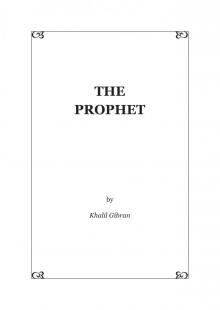 The Prophet
The Prophet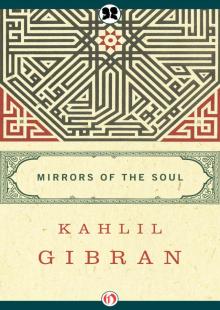 Mirrors of the Soul
Mirrors of the Soul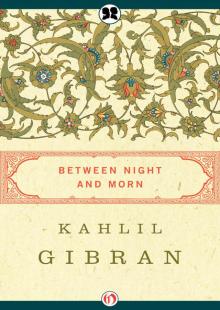 Between Night and Morn
Between Night and Morn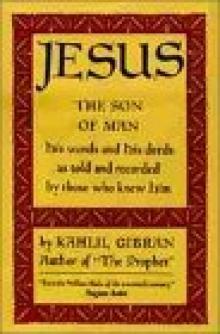 Jesus the Son of Man
Jesus the Son of Man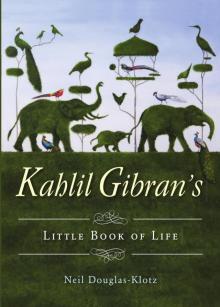 The Little Book of Life's Wisdom
The Little Book of Life's Wisdom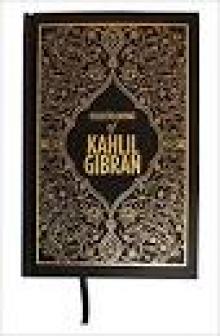 The Kahlil Gibran Collection
The Kahlil Gibran Collection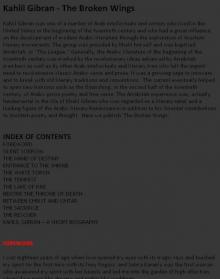 The Broken Wings
The Broken Wings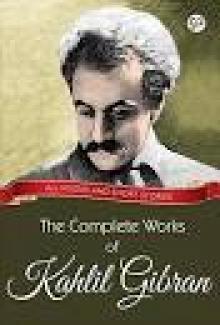 Collected Poetical Works of Kahlil Gibran
Collected Poetical Works of Kahlil Gibran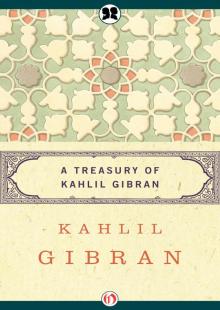 The Treasured Writings of Kahlil Gibran
The Treasured Writings of Kahlil Gibran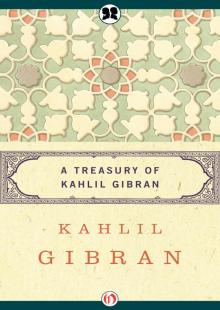 Treasury of Kahlil Gibran
Treasury of Kahlil Gibran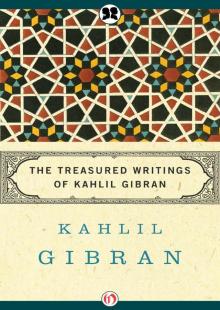 Treasured Writings of Kahlil Gibran
Treasured Writings of Kahlil Gibran